Part 1: The Society of the Cincinnatus: Solving a 170 Year Murder Mystery
Part 2: Poe, Beethoven and Houdini VS the Cult of Artificial Intelligence
Part 3: Poe’s Tales of Ratiocination and the Real C. Auguste Dupin
Part 4: Culture Wars: Mazzini's Minions Enter the Stage
“If you want to create a superstitious mystic, first create a radical empiricist”
-Mackenzie Champollion
In the last segment of this series, we were introduced to Poe’s efforts to defend America’s renaissance heritage from the moral decay infusing itself into the republic via a new movement called ‘Transcendentalism’.
In that location, we were introduced to the connection which leading Transcendalists had to the Young America movement then being steered by Italian social engineer Giuseppe Mazzini and British Intelligence. We also were introduced to the connection behind Young America’s involvement with Albert Pike and the Knights of the Golden Circle.
In this location, we will explore more deeply the essential philosophical flaws of the Transcendentalists, how Edgar Poe defended a true transcendental philosophy, and how Transcendentalism re-incarnated itself as a new gnostic movement after the US Civil War in the form of ‘Theosophy’.
From whence the name ‘Transcendentalism’?
The Transcendentalists derived their name from the writings of German philosopher Emmanuel Kant who called for a type of “transcendental” gnosis beyond mere logic.
In his famous 1842 lecture to the Scottish Rite’s Masonic Temple of Boston, Ralph Waldo Emerson stated:
“The Idealism of the present day acquired the name of Transcendental, from the use of that term by Immanuel Kant, of Konigsberg, who replied to the skeptical philosophy of Locke, which insisted that there was nothing in the intellect which was not previously in the experience of the senses, by showing that there was a very important class of ideas, or imperative forms, which did not come by experience, but through which experience was acquired; that these were intuitions of the mind itself; and he denominated them Transcendental forms.”
For this formula to work, the character and nature of “mind” and “understanding” itself had to be confined to the limits of logical deduction/induction as extolled by the British imperial philosopher John Locke and which Kant discussed at length within his Critique of Practical Reason (1788) and Critique of Judgement (1790).
By this sleight of hand, Kant followed the schools of Aristotle and Francis Bacon by advancing an argument that any cases of mental action which involved creative leaps that broke from either deductive or inductive logic were by their nature, un-intelligible and accessible only by acts of intuition broken free of any effort of reasoning.
As Emerson stated in his masonic lecture: “The extraordinary profoundness and precision of that man's thinking have given vogue to his nomenclature, in Europe and America, to that extent, that whatever belongs to the class of intuitive thought, is popularly called at the present day Transcendental.”
Eureka: Transcendence… guided by Reason
It was to this fallacy that Edgar Allan Poe wrote his 1848 treatise Eureka: An Essay on the Material and Spiritual Universe taking aim at these two schools of logic (deductive and inductive) which Transcendentalists, Kantians and even Lockeans demanded be the confines of the thing called ‘human reason’.
Describing a letter written a thousand years in the future, Poe’s narrator outlines the unfortunate time long past when the world was so confused as to believe that there were only two paths which the mind was permitted to take on its journey towards knowledge:
“Do you know that it is scarcely more than eight or nine hundred years ago since the metaphysicians first consented to relieve the people of the singular fancy that there exist but two practicable roads to Truth? Believe it if you can! It appears, however, that long, long ago, in the night of Time, there lived a Turkish philosopher called Aries and surnamed Tottle.” [Here, possibly, the letter-writer means Aristotle; the best names are wretchedly corrupted in two or three thousand years.]
The fame of this great man depended mainly upon his demonstration that sneezing is a natural provision, by means of which over-profound thinkers are enabled to expel superfluous ideas through the nose; but he obtained a scarcely less valuable celebrity as the founder, or at all events as the principal propagator, of what was termed the deductive or à priori philosophy. He started with what he maintained to be axioms, or self-evident truths: — and the now well understood fact that no truths are self-evident, really does not make in the slightest degree against his speculations: — it was sufficient for his purpose that the truths in question were evident at all. From axioms he proceeded, logically, to results. His most illustrious disciples were one Tuclid, a geometrician” [meaning Euclid] “and one Cant, a Dutchman, the originator of that species of Transcendentalism which, with the change merely of a C for a K, now bears his peculiar name.
Well, Aries Tottle flourished supreme, until the advent of one Hog, surnamed ‘the Ettrick shepherd,’ who preached an entirely different system, which he called the à posteriori or inductive. His plan referred altogether to sensation. He proceeded by observing, analyzing, and classifying facts — instantiæ Naturæ, as they were somewhat affectedly called — and arranging them into general laws.”
Having identified with biting humor the system of Kant (aka: Cant) in establishing the Transcendentalist worldview by mis-defining reason as something limited to computer-logic, Poe’s narrator then takes apart these two false paths labeling them “creeping” vs “crawling”.
Where Aristotle (aka: Aries-Tottle) represented the a-priori school of deductive reasoning (ie: starting with unproven general assumptions then arranging sense perception- aka: creeping), Bacon (aka: The Hog) represented the a-posteriori school of inductive reasoning (starting with patterns in sense perception then making conclusions about general laws- aka: crawling).
Poe attacked either path as “plain, baseless, worthless and fantastic altogether as on account of their pompous and infatuate proscription of all other roads to Truth than the two narrow and crooked paths — the one of creeping and the other of crawling — to which, in their ignorant perversity, they have dared to confine the Soul — the Soul which loves nothing so well as to soar in those regions of illimitable intuition which are utterly incognizant of ‘path’. ”
Within his essay Poe contrasts these stagnant modes with the more potent creative method of intuitive leaps that allow the soul to “soar” with his narrator saying:
“You can easily understand how restrictions so absurd on their very face must have operated, in those days, to retard the progress of true Science, which makes its most important advances — as all History will show — by seemingly intuitive leaps.”
As an exemplar of the healthy scientific mind capable of leaping beyond the limits of creeping and crawling, Poe cites both the figure of Plato and the great German astrophysicist/musician Johannes Kepler who cultivated a much higher quality of intuition than the mystical version promoted by the Transcendalists like Emerson, Fuller, or Thoreau when he wrote:
“Kepler admitted that these laws he guessed — these laws whose investigation disclosed to the greatest of British astronomers that principle, the basis of all (existing) physical principle, in going behind which we enter at once the nebulous kingdom of Metaphysics. Yes! — these vital laws Kepler guessed — that it is to say, he imagined them. Had he been asked to point out either the deductive or inductive route by which he attained them, his reply might have been — ‘I know nothing about routes — but I do know the machinery of the Universe. Here it is. I grasped it with my soul — I reached it through mere dint of intuition.”
Kepler’s War Against False Paths: Aristotle and Rosicrucians
It is here extremely interesting to note that Kepler shared Poe’s understanding of the poison of Aristotelian philosophy and wrote in his 1619 Harmonies of the World:
“Where he [Aristotle] draws a universal conclusion, and convicts Plato of the stupidity which is his own fantasy, and finally where to the Platonic picture of the ‘self-taught’ slave he opposes a contrary picture of his own, asserting that the mind in itself is empty not only of other knowledge and of mathematical categories, but also of species, and is just a blank sheet, so that nothing is written on it… but everything can be written on it; from this aspect, I say, he is not to be tolerated in the Christian religion.”
Also like Poe, Kepler took aim at the school of neo-Platonic Hermeticists and Rosicrucians then led by the Kabbalist Robert Fludd (1574-1637) who, in Kepler’s own lifetime, had been promoting an esoteric school in England which was based on a revival of ancient gnosticism, and pagan magic masquerading as a philosophy of ‘harmony’, ‘beauty’ and ‘intuition’. It was in fact Fludd, who was among the most influential mystics who, along with Francis Bacon established an occult takeover of Britain’s intelligentsia prior to the English Civil War.
In Fludd’s 1617 book also dubbed ‘The Harmony of the World’ the English mystic attempted to impose a penis-centric model of the universe onto the minds of scientists.
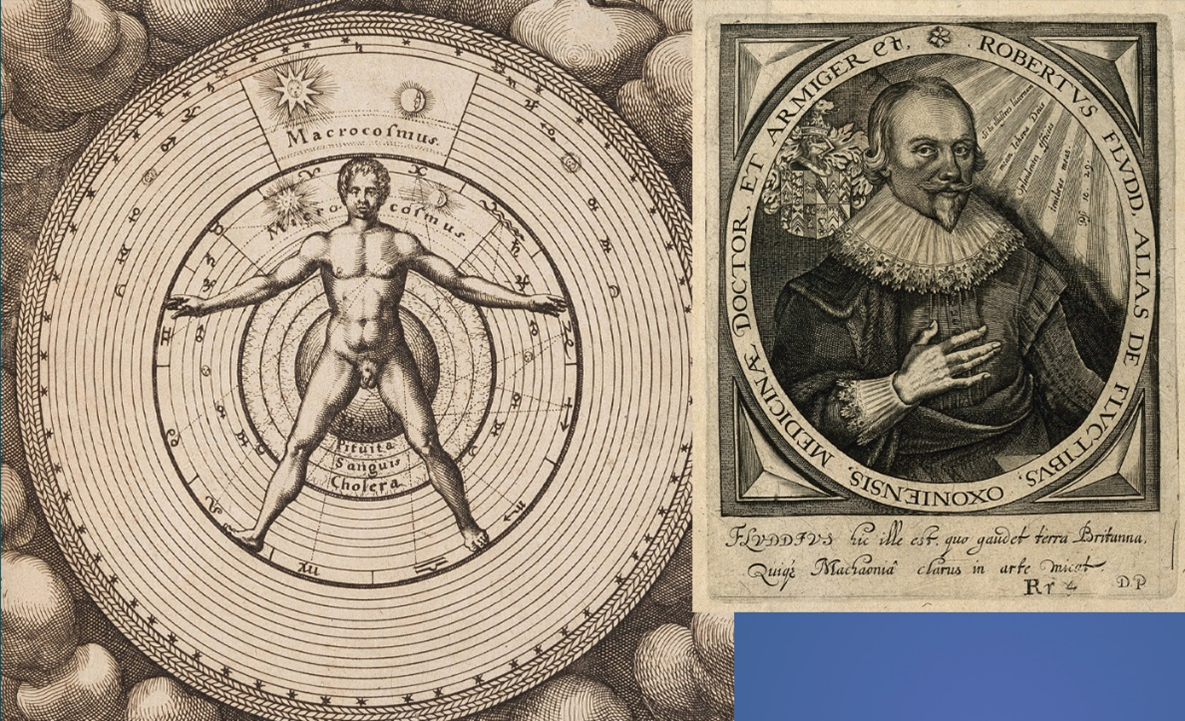
At the end of book five of the Harmonies of the World, Kepler calls out Robert Fludd’s numerological obscurantism saying:
“He [Fludd] takes great delight in topics which are hidden in the darkness of riddles, whereas I strive to bring topics which are wrapped in obscurity out into the light of understanding. The former is familiar to alchemists, Hermeticists, and Paracelsians; the latter is considered their own by mathematicians.”
In Edgar Poe’s 1839 short tale ‘The Fall of the House of Usher’ a morally sick Rosicrucian oligarch named Roderick Usher, is featured alone in his decaying gothic castle yearning pathetically for the glory days of feudalism. Among the authors which Poe features in Roderick’s library of obscure occult books is none other than… Robert Fludd.
Before the ancient decaying hereditary gothic castle of Roderick Usher is destroyed, Poe’s narrator describes Usher’s occult library: “The books which, for years, had formed no small portion of the mental existence of the invalid — were, as might be supposed, in strict keeping with this character of phantasm. We pored together over such works as the Ververt et Chartreuse of Gresset; the Belphegor of Machiavelli; the Selenography of Brewster; the Heaven and Hell of Swedenborg; the Subterranean Voyage of Nicholas Klimm de Holberg; the Chiromancy of Robert Fludd… His chief delight, however, was found in the earnest and repeated perusal of an exceedingly rare and curious book in quarto Gothic — the manual of a forgotten church — the Vigilae Mortuorum secundum Chorum Ecclesiae Maguntinae.”
Like the great scientist-artist Benjamin Franklin earlier, Edgar Poe understood that without the ability to cultivate healthy rigorous creative reason (producing thinking and art “as rigorous as it is free” in the words of Beethoven), then the obsessively logical cage of the Kantian logic and formal “duty” to be “good” would create a suffocation of the soul. This suffocation would easily induce a luciferian rebellion against ‘the tyranny of Reason’ which was then being led by Emerson’s Transcendentalists.
Poe’s Stylus
Eureka: A Prose Poem was intended by the author to be the manifesto that would guide the spirit of a new magazine which Edgar Poe was intending to launch in 1849 which he called ‘The Stylus’.
Poe’s creation of his own magazine would liberate him from the shackles of editorial constraints for the first time in his life.
Following the guiding model of Benjamin Franklin’s Poor Richard’s Almanack and his beloved Friedrich Schiller’s journal Thalia, Poe’s new magazine was to provide a cultural mass education of the population using drama, poetry, science and the arts as well as act as a platform for great republican artists and thinkers to rally around during a time of profound crisis in America’s history, teetering as it was upon the precipice of dissolution which would explode within a matter of 12 years in the form of the Civil War.
This magazine was based upon a series of February 1848 lectures delivered by Poe in New York entitled “The Cosmography of the Universe”. A newspaper covering the lecture stated this directly:
“We understand that the purpose of Poe’s lectures is to raise the necessary capital for the establishment of a magazine, which he proposes to call “The Stylus.” They who like literature without trammels, and criticism without gloves, should sent in their names forthwith as subscribers. If there be in the world a born anatomist of thought, it is Mr. Poe… The severe difficulties with which Mr. Poe has been visited within the last year, have left him in a position to devote himself, self-sacrificingly, to his new task… he will doubtless give it that most complete attention which alone can make such an enterprise successful”.
Having tirelessly collected $1,500 in subscriptions from supporters in Virginia, Poe was finally about to embark upon a new phase of his life’s mission, which he had described as “the one great purpose of my literary life” adding “undoubtedly (unless I die) I will accomplish it.”
Poe’s creation of his own magazine would liberate him from the shackles of editorial constraints for the first time in his life. It would also give him a powerful weapon which he would be able to single handedly wield in the culture war which London’s occult intelligentsia was waging on the minds and morals of the young republic led by Emerson’s Transcendentalists.
Sadly, Poe’s untimely death on October 7, 1849 de-railed this effort.
Yet even with Poe’s death, his spirit and method of creative analysis lived on through his works and continued to inform generations of patriots over 170 years after he transcended his mortal coil. The intensity of fear which Poe’s mind still raises in the hearts of his enemies is proven by the immense multi-generational effort to paint the image of a morbid drug fiend obsessed with the macabre in the place of one of America’s most courageous cultural warriors.
In the next segment, we will continue Edgar Poe as Cultural Warrior with a deeper look into the gnostic revival underlying the Transcendentalists, and how this pagan movement was re-branded by a creature of Giuseppe Mazzini and Bulwer Lytton named Helena P. Blavatsky.




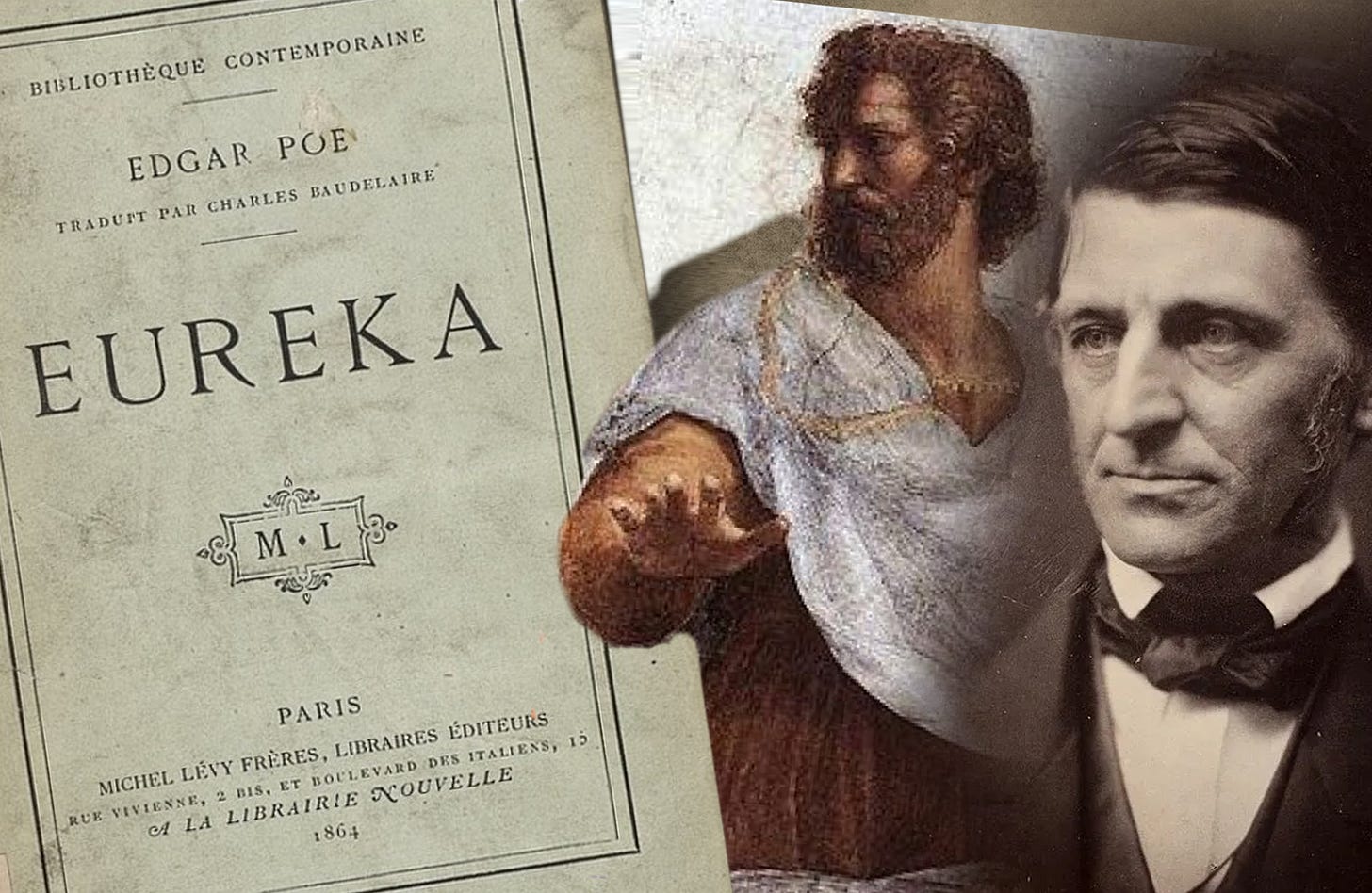
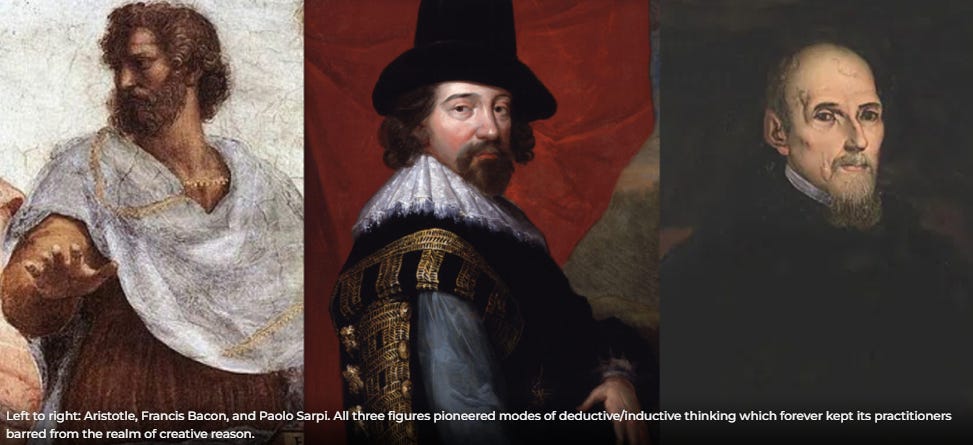
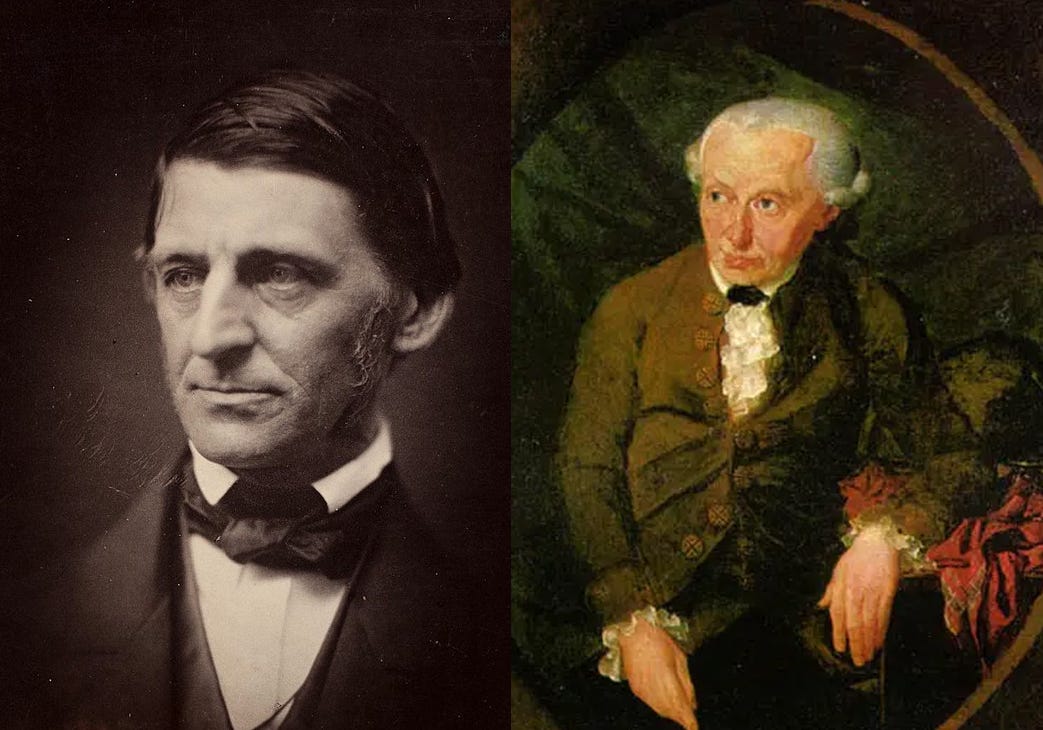
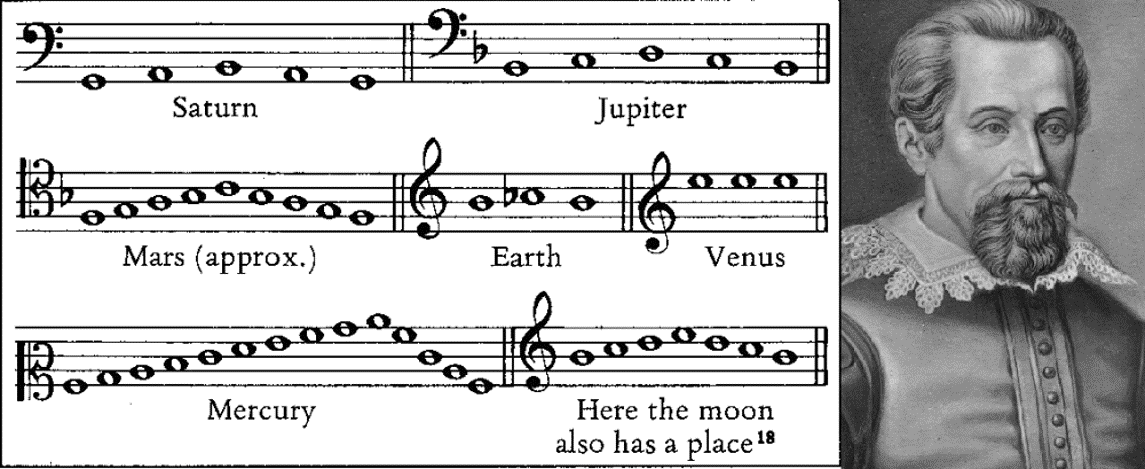
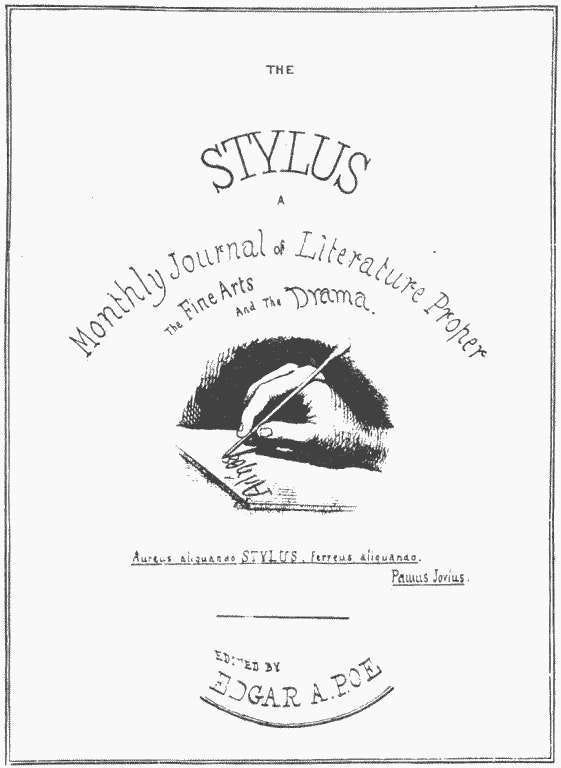




Yowza! The more I learn about Edgar Poe...the easier it becomes to genuinely despise (is burning hatred allowed?) the narrative of lies.
As your research and writing here opened Poe's "Eureka" to me, so too (a decade ago) did a footnote in Immanuel Velikovsky's "World's In Collision" open Poe's "The Conversation Of Eiros And Charmion." Thank you Mr. Ehret.
EDIT: 19JUNE2024 @ 0658 cdt
Mr. Ehret, I've gotten to page 24 in the link you provided to Poe's "Eureka..." Already I've realized that it is a rigorously reasoned series of important arguments about what it means to THINK according to the way God our Father intended for us to think; not how a crew of highfalutin wise-guys force us to think.
For years I tried to read and understand the "rigorous" writing of men like Daniel C. Dennett or Stephen J. Gould and gave up. I thought I was missing the education or the credential necessary for understanding what they had written. The information in Edgar Allan Poe's "Eureka..." has already shown me that the reason I could not understand the writing of men like Dennett & Gould is that what such men attempt to present as Truth is impossible gibberish that creates nothing but confusion & trouble. None of what such men present as rigorous reasoning is 'truth.' All of it is a fabrication of mere opinion salted with with 'scientific' reports of events & circumstances occurring in the presently atomic world which may appear permanent & imperishable at the moment but will vanish in the satanic vacuum of time with the rest of this decay and death we now suffer.
Mr. Ehret, without your deep research into Edgar Allan Poe's life and work, people like me would never have known of him much beyond "The Raven." What you've revealed here, Sir, makes it clear how devoted to wickedness, oppression, tyranny and evil those are who attempt to smother and\or destroy the work, the reputation, the life of Edgar Allan Poe.
P.S. You strike me as the type of young man that MI5, Mossad, CIA, NSA and all the other monster-agencies identify and hire away to hide away from ordinary human life. At this point in the development of whatever will happen next, it is a possibility that you are part of another elaborate IntelOp. People of your giftedness are rare indeed. I prefer to imagine that you are one of those extremely gifted individuals who realized early how precious your individuality is and are now using your gifts to help those of us (like me) who are not so gifted. I really hope I'm right about that. In any case, keep on rockin' because we are living in a rock'n roll world. lol ~Oaf
I’m really enjoying reading your work today….. thank you I will continue now I’ve found you. Thank you!